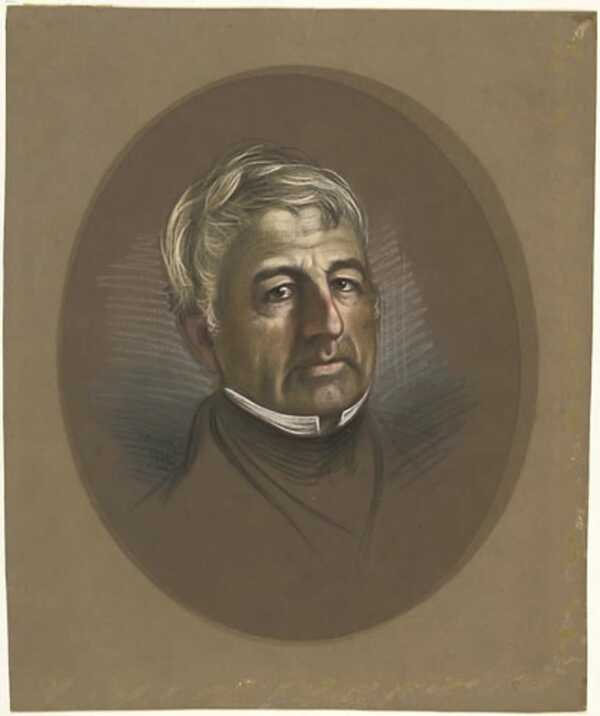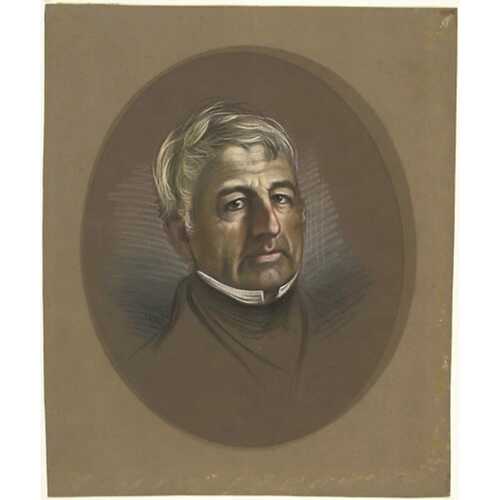
Source: Link
MALHIOT, FRANÇOIS-XAVIER (he also signed Xavier), army and militia officer, merchant, seigneur, and politician; b. 4 Dec. 1781 in Verchères, Que., son of François Malhiot* and Élisabeth Gamelin; d. 12 June 1854 in Boucherville, Lower Canada.
François-Xavier Malhiot was the son of a prosperous merchant in Verchères. In 1804 he and two of his siblings, François-Victor and Pierre-Ignace, were each given a share of their father’s property. He then went into partnership with Pierre-Ignace to keep their father’s business going. Some years earlier he had enlisted, like many of his compatriots, in the Royal Canadian Volunteer Regiment, specially formed for French Canadians by Lord Dorchester [Carleton*] in 1796. On 28 Oct. 1800 Lieutenant Malhiot was instructed to bring back to Montreal from Kingston, Upper Canada, a French agitator named Le Couteulx, who was suspected of spying. In 1802, having joined the militia, he was made a captain in the Saint-Ours battalion. Promoted major in 1812, he obtained the rank of lieutenant-colonel in the same battalion a year later. He held this command until 1828, when he was dismissed by Lord Dalhousie [Ramsay*].
The whole affair of Malhiot’s dismissal caused a considerable stir at the time. He had been named chairman of a voters’ meeting in Surrey riding held on 27 Dec. 1827 to “consider the necessity of making the state of the province known to the king and the two houses of the imperial parliament,” and he had unhesitatingly supported several resolutions censoring the governor’s high-handedness. He had even chaired the committee formed “to communicate with the general committees of the cities of Montreal, Quebec, and Trois-Rivières, in order to agree on the appointment of agents” to take the petitions to England. When several months later he was summoned to explain his conduct before the governor, he agreed to a private hearing on 14 June 1828 with Dalhousie and Colonel George Heriot*. He refused, however, to go to Varennes on 20 June to justify his behaviour towards Lieutenant-Colonel Jacques Le Moyne de Martigny, who had been expelled from a meeting held at Verchères under Malhiot’s chairmanship for attempting to defend the governor’s position. Malhiot’s refusal is the more understandable given that the meeting with Le Moyne de Martigny was to take place at the residence of his principal accuser. Dalhousie responded swiftly. He ordered the office of the adjutant general of the militia to revoke Malhiot’s commission in the militia, as well as those of six other officers belonging to the battalions in Surrey and Richelieu counties. Dated 25 June 1828, the notice appeared in La Minerve on 30 June, just a week after the newspaper had published a long article on the Varennes affair, which it called a grotesque farce. The appearance of this notice was more than enough to fuel the debate. On 4 July Malhiot sent Ludger Duvernay, the printer of La Minerve, copies of two letters which made clear Le Moyne de Martigny’s bad faith and the circumstances in which Malhiot had learned from Heriot about the complaint lodged against him. These letters were published on 7 July, and ten days later Colonel Charles de Saint-Ours*, under whose orders Malhiot had served, spoke well of him in public. The quarrel was not settled until Dalhousie left to assume command of the Indian army in 1829; his departure did not, however, stop Malhiot the following year from publishing a report on the dismissal.
In addition to distinguished military service, Malhiot participated with enthusiasm in politics. He was first elected to the House of Assembly at the age of 33, and represented the constituency of Richelieu from 8 March 1815 to 29 Feb. 1816. Running again after the crisis involving Dalhousie and the assembly, he was elected to replace Aignan-Aimé Massue in Surrey, which he represented from 30 Dec. 1828 to 2 Sept. 1830. He was elected a third time, after the Surrey riding became Verchères, and sat with Pierre Amiot from 26 Oct. 1830 until he gave up his seat on 13 June 1832. Then he was appointed to the Legislative Council, retaining his seat until the constitution was suspended on 27 March 1838.
During the rebellion of 1837–38 Malhiot took a position similar to the one held by most council members, and refused to countenance any form of social upheaval or armed violence. He participated as a delegate from Verchères in the Assemblée des Six Comtés at Saint-Charles-sur-Richelieu on 23 Oct. 1837. He was with Siméon Marchesseault when the meeting turned sour. Marchesseault was roughed up, while Malhiot was kept off the platform by force for having tried to oppose the delegates’ resolutions. In a deposition of 15 November, Malhiot stated that he had withdrawn from the platform of his own accord after hearing the call to arms made by Dr Cyrille-Hector-Octave Côté*, who asserted that “to hold meetings and pass resolutions at them was to demean oneself; what was necessary was to use bullets or to have recourse to the use of bullets.”
Malhiot was not among those who valued social change. A merchant’s son, he had succeeded through a fortunate marital alliance in joining one of the great seigneurial families of his day. On 27 May 1805 at Boucherville he married Julie Laperière, daughter of François Laperière (Boucher de La Perrière) and Marie-Charlotte Pécaudy de Contrecœur. Two years later, when his father-in-law died, Malhiot became one of the heirs to the seigneury of Contrecœur. In 1814 he had become the holder of part of the Saint-Jean fief in the seigneury of Saint-Ours and in 1816 the principal seigneur of Contrecœur, in right of his wife. His concern to maintain existing social relationships is thus understandable. The need became more imperative when on 16 Oct. 1821, again at Boucherville, he remarried, taking as his second wife Sophie Labruère, daughter of Charles Labruère (Boucher de La Bruère) and Josephte Labroquerie (Boucher de La Broquerie), who were both descended from great seigneurial families. Malhiot and his second wife had a number of children but only three survived childhood. In 1846, with the concurrence of his sons, François-Xavier Malhiot sold the seigneury of Contrecœur to John Fraser, a notary and merchant of Terrebonne, and retired to Boucherville. He lived there until his death on 12 June 1854, just a few months before the seigneurial régime was abolished in Lower Canada.
François-Xavier Malhiot is the author of Mémoire de Xavier Malhiot, écuyer, membre de l’Assemblée du Bas-Canada, sur sa destitution par lord Dalhousie, en juin 1828, de la place de lieutenant-colonel dans la milice du comté de Surrey (Montréal, 1830).
ANQ-M, CE1-22, 27 mai 1805, 16 oct. 1821; CN1-295, 14 janv. 1804. La Minerve, 10 janv., 16, 23, 26, 30 juin, 7, 17 juill., 27 oct. 1828; 30 avril, 18 juin 1832; 30 oct. 1837. Quebec almanac, 1800–30. Fauteux, Patriotes, 30. Officers of British forces in Canada (Irving). P.-G. Roy, Inv. concessions, 2: 154, 159, 175. Tureotte, Le Conseil législatif. F.-J. Audet, Contrecœur; famille, seigneurie, paroisse, village (Montréal, 1940). Michel Bibaud, Histoire du Canada et des Canadiens, sous la domination anglaise [1760–1830] (Montréal, 1844; réimpr., East Ardsley, Eng., and New York, 1968). Azarie Couillard-Després, Histoire de la seigneurie de Saint-Ours (2v., Montréal, 1915–17), 2. Wolfred Nelson, Wofred Nelson et son temps (Montréal, 1946). J.-J. Lefebvre, “Études généalogiques: la famille Malhiot, de Montréal et de Verchères,” SGCF Mémoires, 12 (1961): 149–54.
Cite This Article
Serge Courville, “MALHIOT, FRANÇOIS-XAVIER (Xavier),” in Dictionary of Canadian Biography, vol. 8, University of Toronto/Université Laval, 2003–, accessed December 20, 2025, https://www.biographi.ca/en/bio/malhiot_francois_xavier_8E.html.
The citation above shows the format for footnotes and endnotes according to the Chicago manual of style (16th edition). Information to be used in other citation formats:
| Permalink: | https://www.biographi.ca/en/bio/malhiot_francois_xavier_8E.html |
| Author of Article: | Serge Courville |
| Title of Article: | MALHIOT, FRANÇOIS-XAVIER (Xavier) |
| Publication Name: | Dictionary of Canadian Biography, vol. 8 |
| Publisher: | University of Toronto/Université Laval |
| Year of publication: | 1985 |
| Year of revision: | 1985 |
| Access Date: | December 20, 2025 |



